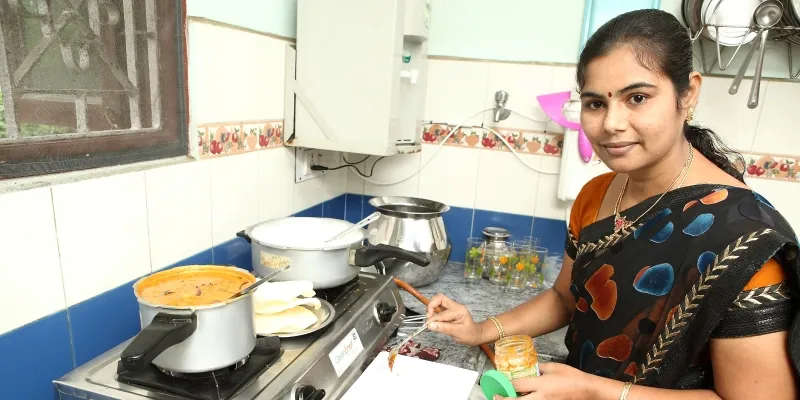Genetics research analyst and serial entrepreneur start an online platform for home cooks in Chennai
Today the world is surrounded by food-tech platforms. Whether they follow the aggregator model, delivery, curation or food creation model, there are no dearth of food choices for consumers. Fromahome, a Chennai-based startup, is bringing in a differentiator by enabling homemakers to sell home cooked food by creating a technology and a logistics platform that efficiently connects them with the consumers.
"It's an online platform that ensures that these women find it easy to use," adds Vinodh Subramanian, one of the Founders. He adds that despite a huge demand for home food, there are very limited options for great home cooked food in the market. He adds that in most places mass preparations of food is carried out in centralised kitchens.

Birth of an idea
The genesis of Fromahome came in from Vinodh's hostel years. While he wouldn't cook himself and was living away from home, he invariably end up eating out at hotels, restaurants, and fast food joints. This he says got in an aversion towards all these outside food. "I realised that this was an inherent need for most people so I decided to come up with this idea," adds Vinodh.
He believes that the only way to solve this is by helping women get online and sell home cooked food to consumers. According to Vinodh, most of the women are unable to go out for employment because of various reasons. This makes them financially dependent on their parents, children, and husband.
"We are on a mission to make such women independent by giving them a platform where they can showcase their cooking skills and sell home food to a larger audience via our online marketplace," adds Vinodh.
Also Read: Bengaluru-based FreshMenu to grow to top 10 cities by next year
Backgrounds and team building
This is Vinodh's fourth startup. The first one was an online marketplace for Tanjore paintings. He says that this startup failed miserably in a few months as the artisans had to give importance to local agents/dealers and gave less preference to our orders as we took time to get traction. The second one was a travel business and the third one was a hospitality company providing accommodation services.

Vinodh has also worked as a genetic research analyst for Histogenetics in Chennai, where he met his Co-Founder Sandhya Sarangan, who was an SAS programmer. She works from the US and takes care of the funding, homemaker acquisition, and research and development. He was also joined in by his college friend who's a techie – Saravanan Priyan, as the third Co-Founder, but he quit due to personal reasons
The core team consists of Sathish, Sasi, Ramesh, Guna, Ranjith, Prashanth and Prithvi.
Also read: Started as a campus eatery in NLSIU, Bhukkad is now growing at 40 per cent month on month
Challenges and traction

The biggest challenge according to Vinodh is the logistics. He says that outsourcing the logistics to a third-party vendor is not a reliable option as the food may get delivered beyond the scheduled time. At the same time, owning an in-house logistics team is costly and will eat most of the revenue. Scaling becomes difficult when we establish our own logistics team and the required investment is huge and will have a direct impact on the profits.
Started in February, the team processes close to 20–30 orders in a day, they've had a total revenue of INR 233,945 and total number of customers are 158. The homemakers are charged a commission of 10–15 per cent on the processed orders. The team is bootstrapped.
Vinodh says they're looking to build an e-commerce ecosystem that helps women start and sustain income-generating projects from their home. He says they will achieve this by expanding all over India. Their immediate goal for the next one year is to become profitable in Chennai, after which they will expand to other cities both Tier-I and Tier-II.
Also Read: DropKaffe aims to bring the cafe experience right to your doorstep
YourStory take
As per the BCG, India's food market size which is at around Rs 23 trillion in 2014 is set to reach around Rs 42 trillion by 2020, along with a three-time increase in average household income from 2010 to 2020.
Speaking of the scope and future of the food-tech ecosystem, Anand Lunia, Founder of India Quotient, says food today is going through the same disruption that Airbnb and Uber are causing in their industries. He adds that the demographics of the young population, double income families, expensive house help, and cultural acceptability of eating out are the big factors expanding the whole market.
One of the big shifts is to create kitchen capacity outside restaurants. Startups often talk about disrupting markets and changing habits. Deciding what to eat is always a personal choice and aiming to disrupt a market dominated by local and multinational food brands is surely a big bet.
While most foodtech players look for an aggregation with home cooks and chefs, Fromahome interestingly is focussed only on home cooks. Also Chennai as a market is more traditional as opposed to the other metro cities. Another foodtech company in Chennai is Atchayam. It has two outlets where people can find food from restaurants like A2B, Madras Coffee House







